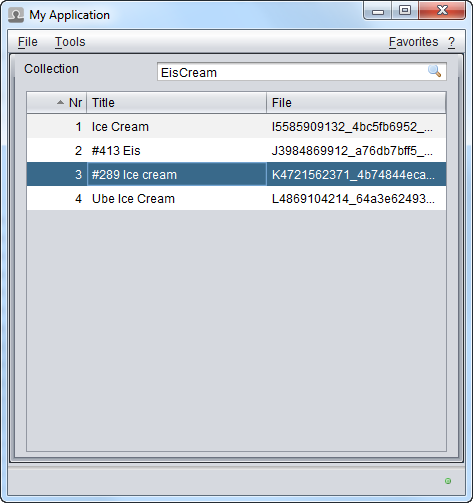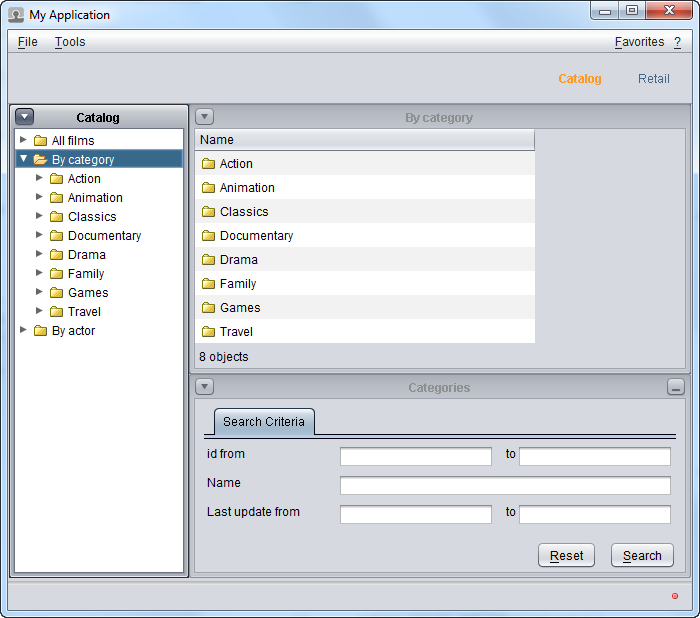Notice: this Wiki will be going read only early in 2024 and edits will no longer be possible. Please see: https://gitlab.eclipse.org/eclipsefdn/helpdesk/-/wikis/Wiki-shutdown-plan for the plan.
Difference between revisions of "Scout/Concepts/Type of application"
Dev.jmini.fr (Talk | contribs) |
|||
| Line 1: | Line 1: | ||
{{ScoutPage|cat=Concepts}} | {{ScoutPage|cat=Concepts}} | ||
| − | During the creation of {{ScoutLink|HowTo|Create_a_new_project|a new Scout Project}}, it is possible to chose the type of Application that should be created. This page gives an overview of the different | + | During the creation of {{ScoutLink|HowTo|Create_a_new_project|a new Scout Project}}, it is possible to chose the type of Application that should be created. This page gives an overview of the different types. |
| − | + | ||
| − | + | ||
== Empty application == | == Empty application == | ||
| Line 13: | Line 11: | ||
[[Image:Scout single form application.png]] | [[Image:Scout single form application.png]] | ||
| − | In this type of application, the main | + | In this type of application, the main window displays a form. In this example (Swing, Nimbus look and feel, Windows), the menu bar is displayed in this main window on top of the main form. |
| − | The SDK | + | The SDK creates a {{ScoutLink|Concepts|Form|form}}, called DesktopForm. This form comes with a {{ScoutLink|Concepts|Process_Service|process service}} (DesktopProcessService) and a {{ScoutLink|Concepts|Form Handler|form handler}} (DisplayFormHandler). |
| − | + | ||
| − | + | ||
| + | With this type of application, there is no default support for outlines and pages. | ||
== Outline based application == | == Outline based application == | ||
| Line 24: | Line 21: | ||
[[Image:Scout outline based application.png]] | [[Image:Scout outline based application.png]] | ||
| − | {{ScoutLink|Concepts|Outline based application|Outline based application}} is the most complete type of application. It is suitable if you want to represent {{ScoutLink|Concepts|Outline|outlines}} and their {{ScoutLink|Concepts|Page|pages}} in the main window. In this example (Swing, Nimbus look and feel, Windows) the main window | + | {{ScoutLink|Concepts|Outline based application|Outline based application}} is the most complete type of application. It is suitable if you want to represent {{ScoutLink|Concepts|Outline|outlines}} and their {{ScoutLink|Concepts|Page|pages}} in the main window. In this example (Swing, Nimbus look and feel, Windows) the main window provides: the menu bar, a way to switch between the Outlines attached to the desktop, and a representation of the active outline: on the left hand side the page tree and on the right the selected page. |
| − | + | ||
| − | + | ||
== See also == | == See also == | ||
Revision as of 13:34, 4 May 2012
The Scout documentation has been moved to https://eclipsescout.github.io/.
During the creation of The Scout documentation has been moved to https://eclipsescout.github.io/., it is possible to chose the type of Application that should be created. This page gives an overview of the different types.
Empty application
This type of application correspond to the minimal application. No additional code is generated.
Single form application
In this type of application, the main window displays a form. In this example (Swing, Nimbus look and feel, Windows), the menu bar is displayed in this main window on top of the main form.
The SDK creates a The Scout documentation has been moved to https://eclipsescout.github.io/., called DesktopForm. This form comes with a The Scout documentation has been moved to https://eclipsescout.github.io/. (DesktopProcessService) and a The Scout documentation has been moved to https://eclipsescout.github.io/. (DisplayFormHandler).
With this type of application, there is no default support for outlines and pages.
Outline based application
The Scout documentation has been moved to https://eclipsescout.github.io/. is the most complete type of application. It is suitable if you want to represent The Scout documentation has been moved to https://eclipsescout.github.io/. and their The Scout documentation has been moved to https://eclipsescout.github.io/. in the main window. In this example (Swing, Nimbus look and feel, Windows) the main window provides: the menu bar, a way to switch between the Outlines attached to the desktop, and a representation of the active outline: on the left hand side the page tree and on the right the selected page.
See also
- The Scout documentation has been moved to https://eclipsescout.github.io/.
- The Scout documentation has been moved to https://eclipsescout.github.io/.
- The Scout documentation has been moved to https://eclipsescout.github.io/.


